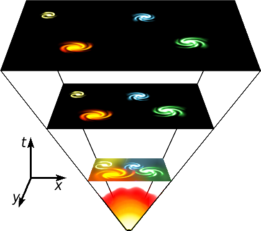 |
| Stephen Hawking |
Stephen Hawking has been in the last decades a
scientific icon for the media. His painful personal situation turned him into a
celebrity who inevitably attracts attention. Therefore, the media
have a tendency to exaggerate his scientific work, attributing
to him achievements that weren’t his, which he would be the first to repudiate,
if he were still among us.
For example, on the occasion of his death, the
following headlines appeared in several media:
•
ElTiempoHoy: Creador
de la teoría del Big Bang y los agujeros negros: fallece Stephen Hawking a los
76 años. (Creator
of Big Bang’s theory and black hole theory: Stephen Hawking dies at 76).
•
Gizmodo Univisión: Del Big Bang a la Teoría del Todo:
el increíble legado científico de Stephen Hawking (From the Big
Bang to the Theory of Everything: Stephen Hawking’s incredible legacy).
What Hawking did in 1970 (together with Roger
Penrose), was formulating singularity theorems that prove that Einstein’s
equations are only compatible with universes which include at least one
singularity (a point of infinite density). In our case, that singularity would
be the Big Bang. But Hawking, of course, was not the author of the Big
Bang theory.
Hawking did not create the theory of black
holes, as the second headline asserts. In fact, the existence of black holes
was proposed in 1916 by Karl Schwarzschild, based on
Einstein’s theory. The theory applicable to these mysterious objects was
developed during the sixties. Stephen Hawking’s participation took place in
1974, when he proposed that black holes might not be so black, since a Hawking radiation could escape them as a
result of the application of quantum mechanics in the vicinity of the black
hole’s event horizon. Again, the media have turned a particular advance into
the original discovery, which was made long before Hawking was born.
The last straw is that he is also attributed the
theory of everything, as in the third headline. The theory of
everything is an imaginative (unreal) name given by some physicists to the standard theory of particle physics. I have
talked about it in
another post. Since Hawking never worked on this standard theory, ascribing
him its creation seems excessive.
Recently, a posthumous article published by
Stephen Hawking with Thomas Hertog has been published. Once again the media have
launched headlines as delirious as the following:
•
The Telegraph: Stephen
Hawking’s ‘breathtaking’ final multiverse theory completed two weeks before he
died.
•
La
Vanguardia (Barcelona): Stephen
Hawking y su teoría: No vivimos en un universo infinito. (Stephen Hawking and his theory: we
don’t live in an infinite universe).
 |
| Alan Guth |
What is the truth in regard to Hawking’s last article?
There is a cosmological theory (the inflationary
universe), first proposed by Alan Guth in 1979, and modified in
the nineties by Andrei Linde, Paul Steinhard and other authors. There are several
different versions of this theory. One of them proposes that the universe
began, not in the Big Bang, but in a state that has been given the name of eternal inflation, from which our universe
would have passed at a certain moment (which we should consider as the origin
of time) to a state of slower cosmic expansion, where we find ourselves now.
According to this theory, other regions of eternal inflation could have passed
to the same state as ours (or to a similar one), so in truth there
would be a multiverse, several universes independent of each other and with
different properties. This theory, which has not been scientifically
proven, could be unified with string theory or M theory, which also comes from
the nineties.
What was Hawking and Hertog’s contribution in
their last article? They have modified slightly the inflation theory to simplify the
passage from eternal inflation to the expanding universe. As a
consequence of their analysis, they propose that the number of universes of the
inflationary multiverse must be much smaller than previously believed (it was
never asserted that it was infinite). This is, therefore, an adjustment to an
existing theory.
But of course, some media, which never have a clue
about scientific questions, have been announcing that Hawking is the author of
the theory of the multiverse (they call it parallel universes)
and of the theory of eternal inflation. As usual, Stephen Hawking, whether he
likes it or not, seems to have discovered everything.The same post in Spanish
Thematic Thread on Popularization of Science: Previous Next
Manuel Alfonseca

No comments:
Post a Comment